新概念英语第二册第14课
- 格式:doc
- 大小:123.50 KB
- 文档页数:11
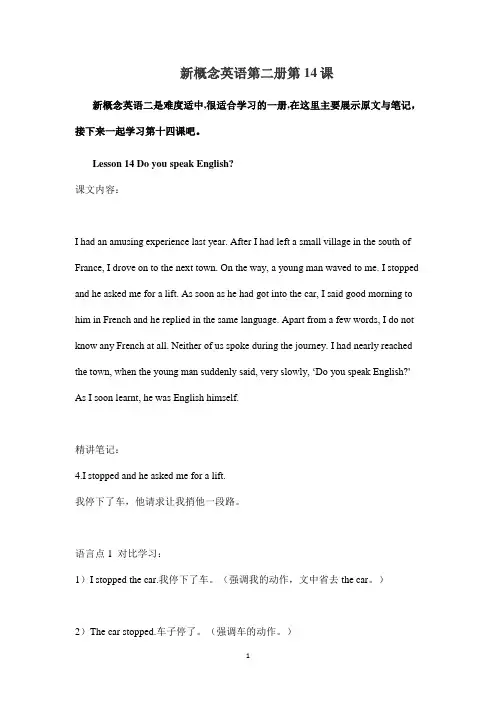
新概念英语第二册第14课新概念英语二是难度适中,很适合学习的一册,在这里主要展示原文与笔记,接下来一起学习第十四课吧。
Lesson 14 Do you speak English?课文内容:I had an amusing experience last year. After I had left a small village in the south of France, I drove on to the next town. On the way, a young man waved to me. I stopped and he asked me for a lift. As soon as he had got into the car, I said good morning to him in French and he replied in the same language. Apart from a few words, I do not know any French at all. Neither of us spoke during the journey. I had nearly reached the town, when the young man suddenly said, very slowly, ‘Do you speak English?' As I soon learnt, he was English himself.精讲笔记:4.I stopped and he asked me for a lift.我停下了车,他请求让我捎他一段路。
语言点1 对比学习:1)I stopped the car.我停下了车。
(强调我的动作,文中省去the car。
)2)The car stopped.车子停了。
(强调车的动作。
)语言点2 ask sb.for sth.向某人请求某事:ask me for a lift向我请求搭便车;A beggar asked me for money when I was walking on the street last night.昨晚我在街上闲逛时,一个乞丐向我要钱。
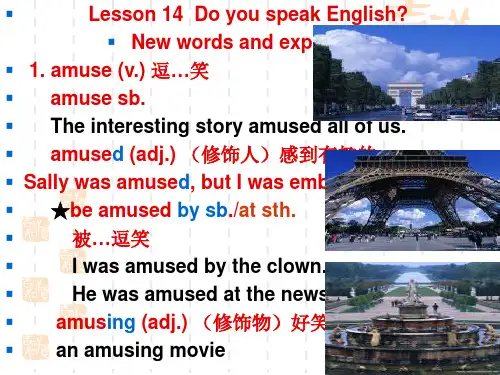
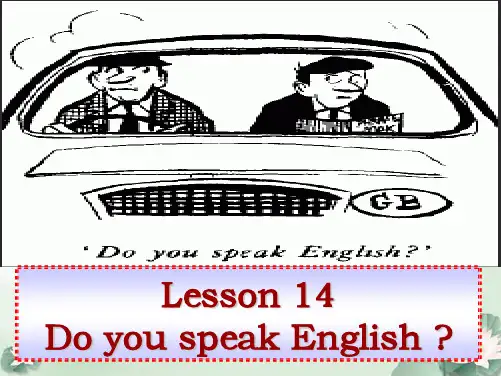
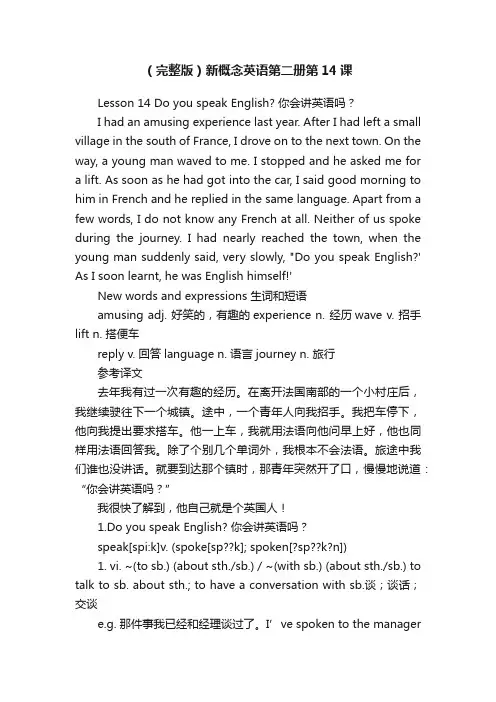
(完整版)新概念英语第二册第14课Lesson 14 Do you speak English? 你会讲英语吗?I had an amusing experience last year. After I had left a small village in the south of France, I drove on to the next town. On the way, a young man waved to me. I stopped and he asked me for a lift. As soon as he had got into the car, I said good morning to him in French and he replied in the same language. Apart from a few words, I do not know any French at all. Neither of us spoke during the journey. I had nearly reached the town, when the young man suddenly said, very slowly, "Do you speak English?' As I soon learnt, he was English himself!'New words and expressions 生词和短语amusing adj. 好笑的,有趣的experience n. 经历wave v. 招手lift n. 搭便车reply v. 回答language n. 语言journey n. 旅行参考译文去年我有过一次有趣的经历。
在离开法国南部的一个小村庄后,我继续驶往下一个城镇。
途中,一个青年人向我招手。
我把车停下,他向我提出要求搭车。
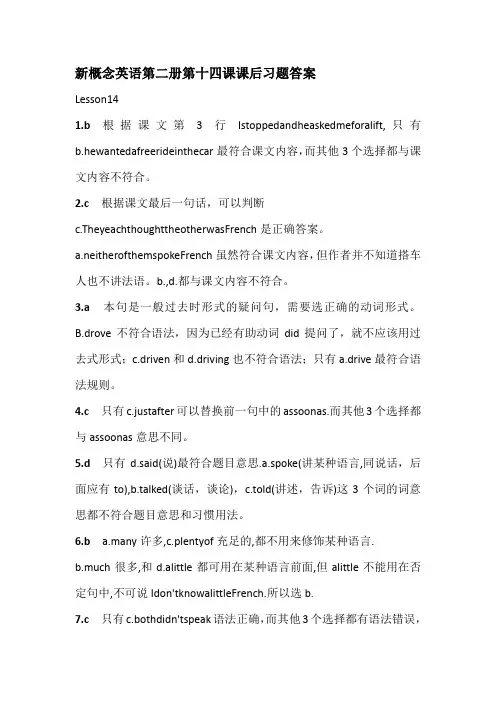
新概念英语第二册第十四课课后习题答案Lesson141.b 根据课文第3行Istoppedandheaskedmeforalift,只有b.hewantedafreerideinthecar最符合课文内容,而其他3个选择都与课文内容不符合。
2.c 根据课文最后一句话,可以判断c.TheyeachthoughttheotherwasFrench是正确答案。
a.neitherofthemspokeFrench虽然符合课文内容,但作者并不知道搭车人也不讲法语。
b.,d.都与课文内容不符合。
3.a 本句是一般过去时形式的疑问句,需要选正确的动词形式。
B.drove不符合语法,因为已经有助动词did提问了,就不应该用过去式形式;c.driven和d.driving也不符合语法;只有a.drive最符合语法规则。
4.c 只有c.justafter可以替换前一句中的assoonas.而其他3个选择都与assoonas意思不同。
5.d只有d.said(说)最符合题目意思.a.spoke(讲某种语言,同说话,后面应有to),b.talked(谈话,谈论),c.told(讲述,告诉)这3个词的词意思都不符合题目意思和习惯用法。
6.b a.many许多,c.plentyof充足的,都不用来修饰某种语言.b.much很多,和d.alittle都可用在某种语言前面,但alittle不能用在否定句中,不可说Idon'tknowalittleFrench.所以选b.7.c只有c.bothdidn'tspeak语法正确,而其他3个选择都有语法错误,所以我们只能选c.8.b前一句中的短语ontheway是“在路上”的意思,只有b.duringthewriter’sjourney(在作者旅途中)同这个短语意思最接近,而另外3个选择都与它的意思不同。
9.c 本句需要选出与前句中的wavedto(向招手)意思相同的词。
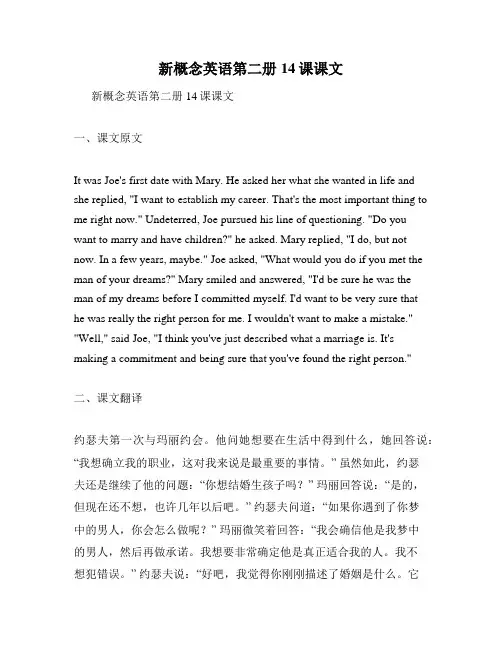
新概念英语第二册14课课文新概念英语第二册14课课文一、课文原文It was Joe's first date with Mary. He asked her what she wanted in life and she replied, "I want to establish my career. That's the most important thing to me right now." Undeterred, Joe pursued his line of questioning. "Do you want to marry and have children?" he asked. Mary replied, "I do, but not now. In a few years, maybe." Joe asked, "What would you do if you met the man of your dreams?" Mary smiled and answered, "I'd be sure he was the man of my dreams before I committed myself. I'd want to be very sure thathe was really the right person for me. I wouldn't want to make a mistake." "Well," said Joe, "I think you've just described what a marriage is. It's making a commitment and being sure that you've found the right person."二、课文翻译约瑟夫第一次与玛丽约会。
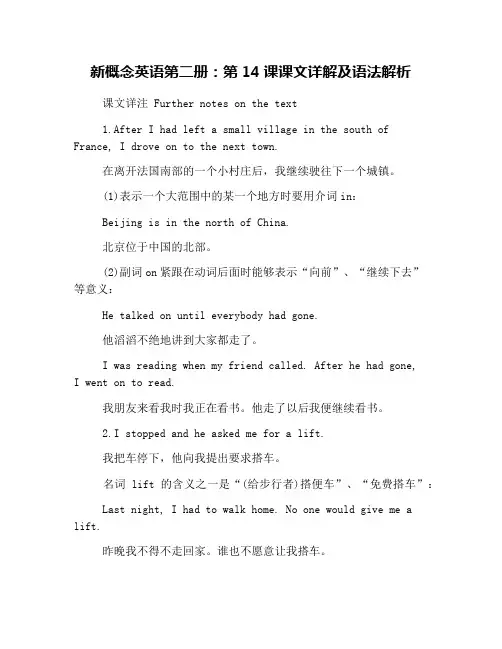
新概念英语第二册:第14课课文详解及语法解析课文详注 Further notes on the text1.After I had left a small village in the south of France, I drove on to the next town.在离开法国南部的一个小村庄后,我继续驶往下一个城镇。
(1)表示一个大范围中的某一个地方时要用介词in:Beijing is in the north of China.北京位于中国的北部。
(2)副词on紧跟在动词后面时能够表示“向前”、“继续下去”等意义:He talked on until everybody had gone.他滔滔不绝地讲到大家都走了。
I was reading when my friend called. After he had gone,I went on to read.我朋友来看我时我正在看书。
他走了以后我便继续看书。
2.I stopped and he asked me for a lift.我把车停下,他向我提出要求搭车。
名词lift的含义之一是“(给步行者)搭便车”、“免费搭车”:Last night, I had to walk home. No one would give me a lift.昨晚我不得不走回家。
谁也不愿意让我搭车。
I was lucky today. I got a lift soon after I had leftthe village.我今天运气好,离开村子不久就搭上了便车。
3.As soon as he had got into the car, I said goodmorning to him in French and he replied in the same language.他一上车,我就用法语向他问早上好,他也同样用法语回答我。
(1)表示时间的固定短语as soon as通常表示“一……就……”,即两个动词之间相隔时间非常短:Tell him the news as soon as you meet him.你一遇见他就把这消息告诉他。
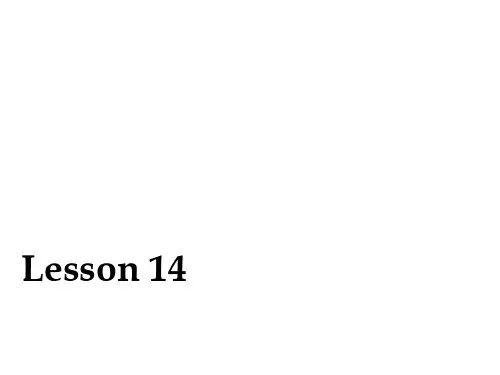
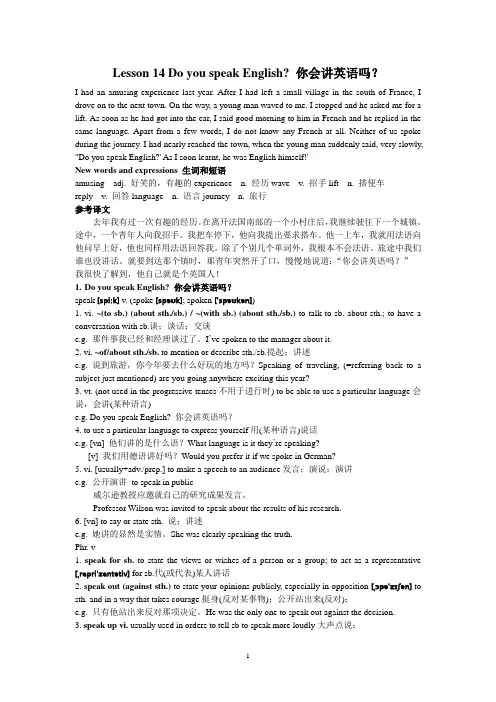
Lesson 14 Do you speak English? 你会讲英语吗?I had an amusing experience last year. After I had left a small village in the south of France, I drove on to the next town. On the way, a young man waved to me. I stopped and he asked me for a lift. As soon as he had got into the car, I said good morning to him in French and he replied in the same language. Apart from a few words, I do not know any French at all. Neither of us spoke during the journey. I had nearly reached the town, when the young man suddenly said, very slowly, "Do you speak English?' As I soon learnt, he was English himself!'New words and expressions 生词和短语amusing adj. 好笑的,有趣的experience n. 经历wave v. 招手lift n. 搭便车reply v. 回答language n. 语言journey n. 旅行参考译文去年我有过一次有趣的经历。
在离开法国南部的一个小村庄后,我继续驶往下一个城镇。
途中,一个青年人向我招手。
我把车停下,他向我提出要求搭车。
他一上车,我就用法语向他问早上好,他也同样用法语回答我。
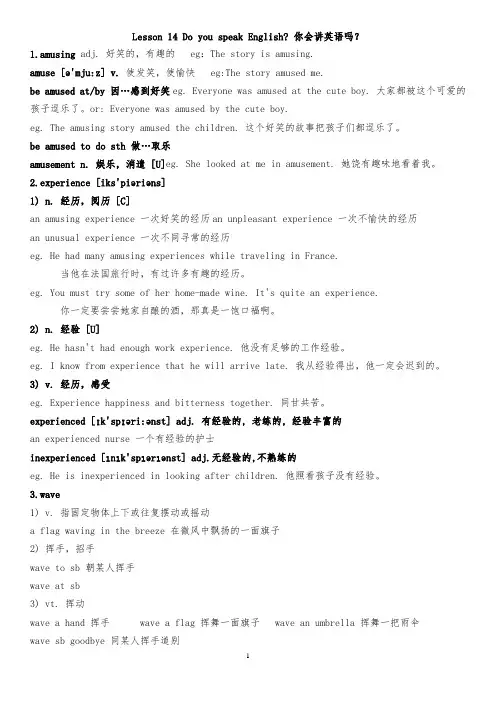
Lesson 14 Do you speak English? 你会讲英语吗?1.amusing adj. 好笑的,有趣的 eg:The story is amusing.amuse [ə'mju:z] v.使发笑,使愉快 eg:The story amused me.be amused at/by 因…感到好笑eg. Everyone was amused at the cute boy. 大家都被这个可爱的孩子逗乐了。
or: Everyone was amused by the cute boy.eg. The amusing story amused the children. 这个好笑的故事把孩子们都逗乐了。
be amused to do sth 做…取乐amusement n. 娱乐,消遣 [U]eg. She looked at me in amusement. 她饶有趣味地看着我。
2.experience [iks'piəriəns]1) n. 经历,阅历 [C]an amusing experience 一次好笑的经历an unpleasant experience 一次不愉快的经历an unusual experience 一次不同寻常的经历eg. He had many amusing experiences while traveling in France.当他在法国旅行时,有过许多有趣的经历。
eg. You must try some of her home-made wine. It's quite an experience.你一定要尝尝她家自酿的酒,那真是一饱口福啊。
2) n. 经验 [U]eg. He hasn't had enough work experience. 他没有足够的工作经验。
eg. I know from experience that he will arrive late. 我从经验得出,他一定会迟到的。
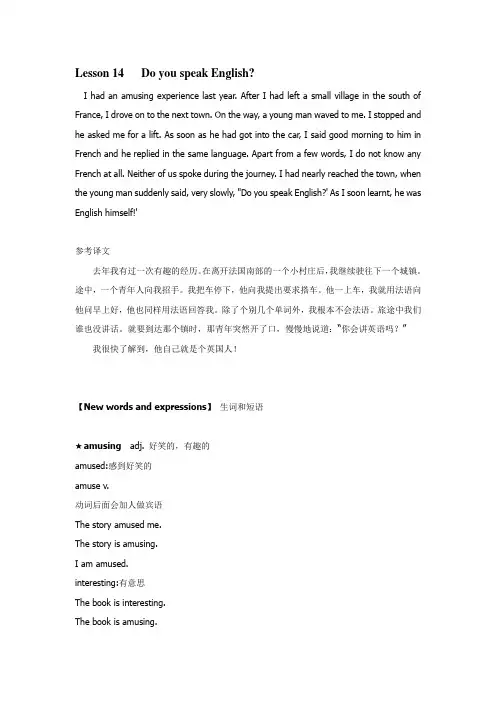
Lesson 14 Do you speak English?I had an amusing experience last year. After I had left a small village in the south of France, I drove on to the next town. On the way, a young man waved to me. I stopped and he asked me for a lift. As soon as he had got into the car, I said good morning to him in French and he replied in the same language. Apart from a few words, I do not know any French at all. Neither of us spoke during the journey. I had nearly reached the town, when the young man suddenly said, very slowly, "Do you speak English?' As I soon learnt, he was English himself!'参考译文去年我有过一次有趣的经历。
在离开法国南部的一个小村庄后,我继续驶往下一个城镇。
途中,一个青年人向我招手。
我把车停下,他向我提出要求搭车。
他一上车,我就用法语向他问早上好,他也同样用法语回答我。
除了个别几个单词外,我根本不会法语。
旅途中我们谁也没讲话。
就要到达那个镇时,那青年突然开了口,慢慢地说道:“你会讲英语吗?”我很快了解到,他自己就是个英国人!【New words and expressions】生词和短语★amusing adj. 好笑的,有趣的amused:感到好笑的amuse v.动词后面会加人做宾语The story amused me.The story is amusing.I am amused.interesting:有意思The book is interesting.The book is amusing.funny:好笑的,可以指贬义,开心的,令人开心的interesting/funny story★experience n. 经历经验、体验:不可数名词经历、感受:可数名词He has a lot of experience. He has a lot of experiences.Experience is the best teacher. 经验是最好的老师。
【New words and expressions】amusing [?‘mju:zi?]adj. 好笑的,有趣的experience [iks’pi?ri?ns] n. 经历wave [weiv] v. 招手lift [lift] n. 搭便车reply [ri'plai] v. 回答language ['l??ɡwid?] n. 语言journey ['d??:ni] n. 旅行1. amusing adj. 令人发笑的The story is amusing. (好笑的)amused adj. 感到好笑的I am amused.amuse v. 使发笑,使愉快The story amuses me.funny adj. 好笑的(不一定要笑出声可以指贬义),开心的,令人开心的interesting / funny story类似词语:excite 令人兴奋exciting excitedinterest 令人感兴趣interesting interestedThe exciting news made us excited.The book is interesting and we are interested in it.2. experience①n. 经历(可数)an unusual experienceHe has a lot of experiences.②n. 经验,体验(不可数)She has a lot of teaching experience.③vt. 经验,体验Ganzhou has experienced great changes.experienced adj. 有经验的,经验丰富的He is an experienced doctor.inexperienced 无经验的,不熟练的eg. He is inexperienced in looking after children 3.wave v. 招手wave to sb. 向某人招手4. lift1) Vt.举起,抬起eg. The box is too heavy ;I can’t lift it.2)vi. (雾、云)消散,(雨、雪)停止Eg. The fog has lifted.3) n. 电梯elevator (Am)4) n. 搭便车give sb a lift 让某人搭便车5. reply v. 答复;回答reply to = answer 回应;回答answer my questionreply to my question我会给你回信的。
新概念英语第二册第十四课Lesson 14 An exciting tripThe train for Glasgow leaves from platform 3. At what time does it leave?Excuse me, is this platform 3?Yes, that's right.What time does the train for Glasgow leave?It leaves at 10:30. You've got about ten minutes.Thank you.Are you going to Glasgow?No, I'm going to Edinburgh.Oh, so am I.Are you?Yes. We can travel together, if you like.That's a good idea. Perhaps we can sit together on the train.There's a good restaurant car on this train.Is there?Yes. We'll be able to have lunch on the train.That's great. I'm looking forward to that.We had a very good lunch on the train.Yes, we did. It was a very good idea to have lunch on the train.It's certainly better than having lunch at a station.The scenery is very beautiful, isn't it?Yes, it is. It's very different from the scenery in the south.We arrived in Edinburgh at two thirty.Thank you for travelling with British Rail. Goodbye. Goodbye. It was a very good trip.。
Lesson 14 Do you speak English? 你会讲英语吗?I had an amusing experience last year. After I had left a small village in the south of France, I drove on to the next town. On the way, a young man waved to me. I stopped and he asked me for a lift. As soon as he had got into the car, I said good morning to him in French and he replied in the same language. Apart from a few words, I do not know any French at all. Neither of us spoke during the journey. I had nearly reached the town, when the young man suddenly said, very slowly, "Do you speak English?' As I soon learnt, he was English himself!'New words and expressions 生词和短语amusing adj. 好笑的,有趣的experience n. 经历wave v. 招手lift n. 搭便车reply v. 回答language n. 语言journey n. 旅行参考译文去年我有过一次有趣的经历。
在离开法国南部的一个小村庄后,我继续驶往下一个城镇。
途中,一个青年人向我招手。
我把车停下,他向我提出要求搭车。
他一上车,我就用法语向他问早上好,他也同样用法语回答我。
除了个别几个单词外,我根本不会法语。
旅途中我们谁也没讲话。
就要到达那个镇时,那青年突然开了口,慢慢地说道:“你会讲英语吗?”我很快了解到,他自己就是个英国人!1.Do you speak English? 你会讲英语吗?speak[spi:k]v. (spoke[spəʊk]; spoken[ˈspəʊkən])1. vi. ~(to sb.) (about sth./sb.) / ~(with sb.) (about sth./sb.) to talk to sb. about sth.; to have a conversation with sb.谈;谈话;交谈e.g. 那件事我已经和经理谈过了。
I’ve spoken to the manager about it.2. vi. ~of/about sth./sb. to mention or describe sth./sb.提起;讲述e.g. 说到旅游,你今年要去什么好玩的地方吗?Speaking of traveling, (=referring back to a subject just mentioned) are you going anywhere exciting this year?3. vt. (not used in the progressive tenses不用于进行时) to be able to use a particular language会说,会讲(某种语言)e.g. Do you speak English? 你会讲英语吗?4. to use a particular language to express yourself用(某种语言)说话e.g. [vn] 他们讲的是什么语?What language is it they’re speaking?[v] 我们用德语讲好吗?Would you prefer it if we spoke in German?5. vi. [usually+adv./prep.] to make a speech to an audience发言;演说;演讲e.g. 公开演讲to speak in public威尔逊教授应邀就自己的研究成果发言。
Professor Wilson was invited to speak about the results of his research.6. [vn] to say or state sth. 说;讲述e.g. 她讲的显然是实情。
She was clearly speaking the truth.Phr. v1. speak for sb.to state the views or wishes of a person or a group; to act as a representative [ˌrepriˈzentətiv] for sb.代(或代表)某人讲话2. speak out (against sth.) to state your opinions publicly, especially in opposition [ˌɔpəˈzɪʃən] to sth. and in a way that takes courage挺身(反对某事物);公开站出来(反对):e.g. 只有他站出来反对那项决定。
He was the only one to speak out against the decision.3. speak up vi. usually used in orders to tell sb to speak more loudly大声点说:e.g. 请大点声讲------我们在后面听不见。
Please speak up---we can’t hear you at the back. speaker n.1. a person who gives a talk or makes a speech 发言者;演讲者2. a person who is or was speaking说话者3. a person who speaks a particular language 讲(某种语言)的人e.g. 以英语为母语的人native speakers of English4. (the) Speaker the title of a person whose job is to control the discussions in a parliament(议会的)议长e.g. 英国下议院议长the Speaker of the House of Commons [ˈkɔmən]5.扬声器;喇叭2. I had an amusing experience last year. 去年我有过一次有趣的经历。
1) amusing [əˈmju:ziŋ] adj. funny and enjoyable逗人笑的;有乐趣的;好笑的adv. amusinglye.g. 逗人笑的故事/游戏an amusing story/game她写的信十分有趣。
She writes very amusing letters.amused [əˈmju:zd] adj. ~(at/by sth) / ~(to see, find, learn, etc.) thinking that sb./sth. is funny, so that you smile or laugh 逗乐的;觉得好笑的:e.g. 我们都被他的故事逗笑了。
We were all amused at his stories.他看见她玩这个游戏十分认真的样子,觉得好笑。
He was amused to see how seriously she took the game.IDM: keep sb. amused to give sb. interesting things to do, or to entertain them so that they do not become bored使某人快乐;使某人消遣e.g. 嬉水可以使孩子们玩乐好几个小时。
Playing with water can keep children amused for hours.amuse [əˈmju:z] v.1. [often passive] to make sb. laugh or smile逗笑;逗乐e.g. [vn] 我的滑稽图画把孩子们逗乐了。
My funny drawings amused the kids.这个会逗你笑的。
This will amuse you.[vn to inf] 想到就在这会儿他们大概正在谈论他,他不禁笑了起来。
It amused him to think that they were probably talking about him at that very moment.2. vt. to make time pass pleasantly for sb./yourself(提供)消遣;(使)娱乐:e.g. 我相信我能自娱自乐几个小时。
I’m sure I’ll be able to amuse myself for a few hours.n. amusement n.1. [u] the feeling that you have when sth. is funny or amusing, or it entertains you 可笑;愉悦;娱乐e.g. 使我感到好笑的是,他竟然打不开门。
To my amusement he couldn’t get the door open.2. [c, usually pl.] a game, an activity, etc. that provides entertainment and pleasure娱乐活动;游戏;消遣活动amusement park n. 游乐场;娱乐园2) experience [iksˈpiəriəns] n., v.n. 1. [u] the knowledge and skill that you have gained through doing sth. for a period of time; the process of gaining this(由实践得来的) 经验;实践e.g. 有十多年教学经验to have over ten years’ teaching experience你以前干过这种工作吗?Do you have any previous experience of this type of work? (previous adj. ['pri:viəs] [only before noun] 先前的;以往的)我们都从经验中学习。